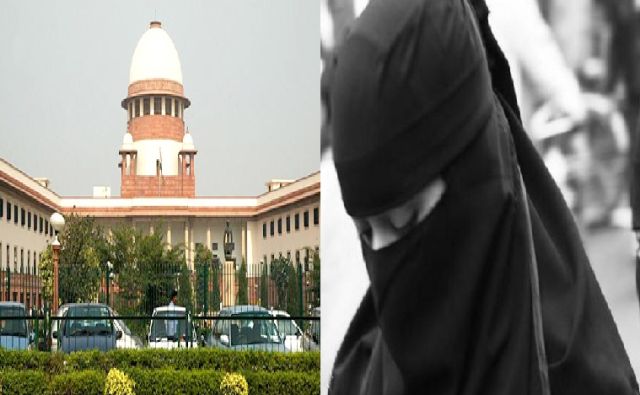 New Delhi : The Samastha Kerala Jamiathul Ulema on Tuesday moved the Supreme Court challenging the Muslim Women (Protection of Rights on Marriage) Ordinance, 2018 on the grounds that it invokes penal provisions against a class of people based on their religious identity.
New Delhi : The Samastha Kerala Jamiathul Ulema on Tuesday moved the Supreme Court challenging the Muslim Women (Protection of Rights on Marriage) Ordinance, 2018 on the grounds that it invokes penal provisions against a class of people based on their religious identity.
The Muslim Women (Protection of Rights on Marriage) Ordinance, 2018 — commonly referred to as triple talaq ordinance — abolishes the practice of triple talaq and makes its punishable.
Founded in 1925, the Samastha Kerala Jamiathul Ulema ia a religious organisation of the Sunni Muslim scholars and clerics in Kerala.
Contending that the triple talaq ordinance is violative of Article 14, 15 and 21 of the Indian Constitution, the petitioner organisation has said that it has national ramification as it has introduced penal provision punishing a class of persons based on religious identity.
The Jamiathul Ulema has contended that the ordinance is “causative of grave public mischief, which, if unchecked, may lead to polarisation and disharmony in society”.
The petitioner organisation has taken exception to the word “unabated” in the ordinance, which says that despite the Supreme Court holding the practice of triple talaq (talaq-e-biddat) as unconstitutional, it is continuing “unabated”.
Describing the use of word “unabated” as “entirely whimsical”, the petitioner organisation termed it “misleading, inept and improper”.
It said that it is doubtful that anybody, including the Central government, has any idea of all-India statics on the occurrence of triple talaq across te country prior to the Supreme Court judgment.
It has contended the fact that the matter is pending before the Rajya Sabha is “reason to await the outcome of the matter, not basis to accelerate its coming into force by an emergency ordinance”.
The petitioner organisation have contended that the real thrust of the ordinance is not abolition of triple talaq but punishment of Muslim husbands.
Section 4 of the ordinance imposes a maximum sentence of three-year imprisonment when a Muslim husband pronounces triple talaq. The offence is also cognizable and non-bailable as per Section 7.
“Creation of an offence may be the prerogative of the legislature. The government is duty-bound to act reasonably and sensibly, not merely in administrative matters but also in sovereign matters,” says the petition, contending that to its knowledge, “there is no informed assessment or study that forms basis for the Central government to have created this offence”.
“Some isolated instances of the practice that have occurred after the top court judgment does not imply that a penal provision is required to be immediately enacted to prevent the practice,” the petition has contended.
Having said this, the petitioner Samastha Kerala Jamiathul Ulema has contended that the ordinance under challenge is “patently unconstitutional and has immediate propensity to deprive Muslim men and women of their fundamental rights enshrined under Articles 14, 15 and 21 of the Constitution”.
—IANS





0 Comments